Holmes glanced around himself suddenly. "We should sweep the deck," he said, "in case that wasn't the only one." The others agreed, and they began to methodically check the corridors between the silent greenish tanks. As they did so, the sound of something approaching became audible. Weapons were hefted, but it was soon apparent that the sounds were those of several humans, and a moment later Horton and three soldiers came around a corner and into view.
 |
Everyone relaxed a little, except Churchill. Keeping his weapon trained somewhere between the newcomers, he challenged them to identify themselves. Exchanging glances, Horton and the soldiers spoke reassuringly to the shaken Major, who holstered his pistol with a quick apology. As Holmes explained what they'd found, the newcomers stopped casting worried looks at Churchill and grew nervous again, shifting sweaty grips on their rifles.
Churchill glanced around. "What are you doing here; and where's Cavendish?" he asked suddenly. Horton lifted a hand. "We'd moved on down to the control room," he said, "and I don't think we could shift Sir George from there with explosives. But when we heard shots from up here, we came to investigate." Churchill's eyebrows rose. "You left him down there on his own?" he barked. Horton shook his head. "We left Pte Percy with him, and Carslake and Wilson are down there too," he said quickly. Churchill rolled his eyes. "Considering what we have found here, we should rejoin the group and stick together from then on!" he said. Horton nodded. "Good thinking," he said.
 |
Cavendish looked up as the first men started clambering down into the control room. "Ah, you're back," he said, "all well?" Holmes looked at him levelly. "There are aliens aboard," he stated flatly and not entirely accurately. Cavendish's eyes lit up. "Really?" he said animatedly, "how splendid?" Holmes and Quartermain exchanged significant glances. "Not really," said Holmes, and explained as Churchill set a guard at the hatches above and below.
All the while, Carslake and Wilson had been busily occupied at the consoles, measuring, sketching, photographing and testing. Holmes eyed this worriedly. "I think, given the dangers of the Fighting Machine's controls and the chance of more intruders," he said, "you'd better leave messing with those until we have completely searched the Cylinder." The scientists glanced at Cavendish, who shrugged, clearly not convinced, but prepared to accept his experts' judgement. Everyone collected their gear and headed back to the open hatch to descend once more.
Churchill left two of the soldiers on the control deck, in case of unwanted visitors, and Holmes left the Heat Ray he'd taken from the small walker. The soldiers eyed it curiously, but Holmes spoke quietly and earnestly to them about it, and after that they couldn't stand quite far enough away from it however they tried.
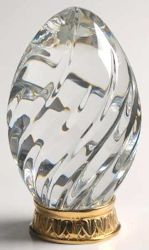 |
As Quartermain walked past the central Martian "chair" on the control deck, something caught his quick eye. He blinked and looked again. The crystal egg was gone... Frowning, he followed the others down to the next level of the Cylinder.
D9 The next "deck" down wasn't a "deck" at all - in that it had no immediate floor. The “back” third of the cylinder (in other words, the bit under the ground) was one huge hall, a hundred feet high, with great towering structures of metal and crystal dotted with lights looming from the mists at the bottom. Mesh gantries joined by mesh tubes (Martian ‘stairs’) zigzagged down the space to provide access to the bottom. A gentle, disquieting hum filled the air.
As this incredible sight sank into the scientists and soldiers, Quartermain quietly whispered his discovery into the ears of Holmes and Churchill. Holmes, naturally, assured the hunter that he had also noticed its' disappearance, though Quartermain had a sneaking suspicion that the Great Detective was rather saving face. After a quick discussion, they spread out to do some extramural investigation of their own employer.
Cavendish was clearly overjoyed at the latest discovery; apparently in all the other cylinders these structures, some sort of engines, had been removed or dismantled. He directed the scientists Carslake and Wilson to set up camp in here and concentrate on finding out how the things work, and picked out three soldiers (Roberts, Spencer, Daventry) to stay with them. The soldiers were clearly not overjoyed by this. Churchill began to argue with him about the need to secure the Cylinder before "stranding" anyone inside. Cavendish reacted a little like a kid dragged out of sweetshop but eventually relented.
While this was happening, Holmes "stumbled" into him, attempting to get lucky and fish in the right pocket for the Egg. However good he was at catching criminals and deducing what crimes were committed, however, as a pickpocket he was a fairly poor plumber. In the confusion he apologized profusely for his "stumble". "Think nothing of it, my dear chap," said Cavendish easily. "Oh, by the way," said Holmes in a normal voice, "When we first found the control room, there was an oval crystal in the middle, on that stand thing. Have you seen it?" Cavendish looked back at him in puzzlement. "No," he said, "what did it look like?" Holmes studied him intently as he spoke; either the man was telling the truth, which he thought unlikely, or he was a consumate actor - or politician. He shrugged. "Oh, well, many strange things happening in here, eh?" he said disarmingly.
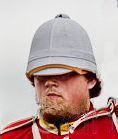 |
While Cavendish was distracted, Churchill called his soldiers over. Initially, he picked out two to stay with the scientists if they remained when the rest of the explorers returned to the surface; then, slightly more quietly, he asked the six if they had seen anything to do with the Crystal Egg. After a moment, Pte Blakeney cleared his throat. "Well, sir," he said hesitantly in a broad Cockney accent, "It woz there when we came in, I noticed it. I did see Sir George pocket summink, but I figgers, 'e's in charge, in'ne, an' if e' wants to taik summink, that's 'is business, sir. I can't swear that was what it was, though. I 'opes I ain't done wrong, sir?" Churchill shook his head. "You did well, Cyril," he said, "you kept your eyes open and used your brain." Blakeney straightened, eyes bright with pride at the praise. With a nod, Churchill dismissed the men to their places.
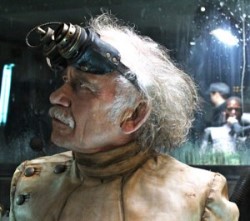 |
While this was happening, Quartermain was talking to Carslake, who was clearly trying to work instead of answer him. Unsure how to talk to people like this, he groped for a subject. "So...." he said. "Did you see a crystal egg sort of thing above?" Carslake looked up for a moment. "Ah - yes, now you mention it," he said in his thin, precise voice. "We'll have to look at that later." Quatermain thought for a moment. "It seems to be gone. Do you think it might power this lot?" he asked. Carslake stared at him for a moment. "Well, you see," he said, clearly speaking carefully and kindly as if to someone of limited understanding. "All this, these engines - yes, we can definitely call them engines - it's all rather big, isn't it, mmm? And - advanced as it all is - you would expect whatever powers them to be, um, also rather, er, big, yes?" He paused. "Also, if this crystal thingummy was powering these," he waved an arm at the humming, glowing edifice, "and it's gone, you'd rather expect them to have, um, stopped a bit, wouldn't you?" Quartermain retreated in defeat.
Holmes meanwhile, had drawn Horton into a quiet corner and frankly confronted him with Cavendish's probable doings. To his amazement, Horton immediately agreed with his conclusions. "Yes," he said, "Sir George has the Egg, and he did secure it quietly. It's very much not the sort of thing we want to come to the attention of any more people than are absolutely necessary. I know it looks a little fishy, but trust me; when we return to base, you will be fully briefed and all will be made clear. All right?"
The four investigators gathered inconspicuously, and discussed their findings. As Horton had said, it did all feel fishy, but Horton's openness had presented a different angle to their suspicious one, and they elected to give Cavendish the benefit of the doubt and wait to see what was going on.
In the end, the whole expedition headed for the surface together, clambering laboriously through the tilted cylinder. Finally, they emerged onto the "roof" level at the top, blinking and dazzled by but grateful for the clean, wholesome thin sunlight of a December day. Cavendish leaned over the top and commenced yelling and waving, demanding the remainder of the science team be sent in at once, while the rest of the expedition began to climb down the scaffolding that had been erected for access.
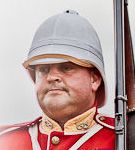 |
First down was Private Perkins, and as he reached the ground loud shouts broke out at the rim of the pit where the cordon was. Rifle shots rang out. A moment later, the most soul-chilling scream imaginable came from Perkins as, without the slightest warning, he exploded into flames! His body writhed and thrashed as the flames contracted his muscles and the fluids in his body boiled away into hideously-coloured steam in an instant. The Heat-Ray! A moment later his corpse hit the ground and utter pandemonium erupted.
There was a moment of considerable confusion as some of the explorers attempted to get down the scaffolding and others to climb back up to seek cover. In the tangle, a handful of grit fell into Churchill's eyes, blinding him. Keeping his head, he bawled orders to his men to climb, take cover and return fire as he clung precariously to the rungs, struggling to clear his vision. Below, soldiers of the garrison were firing wildly, some shooting uselessly at the long-disabled Fighting Machine that still stood over the pit.
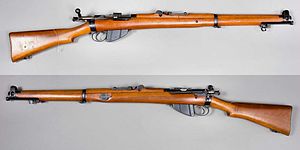 |
Quartermain had been far nearer the bottom of the ladder than most, and had a very strong preference for having his feet on solid earth in a fight; as a result he dropped the few remaining feet to the ground. He'd landed very close to poor Perkins' remains, and murmured an apology to the soldier's shade as he grabbed his fallen rifle and threw himself down behind the heavy wood baulks that anchored the scaffolding. Holmes and Smith followed the soldiers up, tumbling into cover behind the lip of the cylinder. There they found Horton struggling to keep Sir George from leaning out to see what was going on.
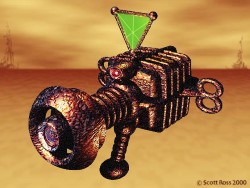 |
Cautiously peering over, Holmes caught sight of a flash of movement, and recognized the same small walker as the one they'd killed inside the cylinder. There seemed to be around half a dozen of the things, hurtling around the campsite, blasting down soldiers and scientists as they scrambled for cover. Holmes' revolver was a fine weapon at close quarters, but at this range of little use. An idea struck him and he pulled open the bag he'd carried the captured Heat Ray projector in. Ignoring worried glances from the soldiers to either side of him, he levelled it over the edge of the Cylinder and experimented with the controls. Unexpectedly, it went off; a nearly invisible beam of pure heat lanced across the pit and struck a supply crate in the camp, which instantaneously exploded into flames.
Below, Churchill had cleared his vision, just in time to see the scaffolding-pole in front of him instantly melted as a shot from a Heat Ray struck it. The scaffolding creaked alarmingly. Scrambling down, he cast frantically around for cover, and like Quartermain, acquired a rifle from a fallen soldier. His mind tallied the hostile force as he did so; six or so.
Quartermain lined a walker up with his rifle, led it, and squeezed off a shot. The bullet clipped the main bulk of the thing, sending a piece spinning off, but didn't penetrate completely. At least they don't jump like impala, he thought, working the bolt for another round. As he did so, his wooden rampart erupted in an explosion of expansion as a Heat Ray struck it, bits of wood, molten metal and gravel blasted in all directons.
 Keeper's Note: I was glad I don't use a DM's screen this evening, because no-one would ever have believed I didn't fudge for my daughter's character! The small Heat Ray does 5d6 damage, which for a CoC character with around 15hp is almost certain death. I rolled the dice in plain view and got 4 ones and a three. Never in the field of RPG has one character owed so much to so few (pips).... Keeper's Note: I was glad I don't use a DM's screen this evening, because no-one would ever have believed I didn't fudge for my daughter's character! The small Heat Ray does 5d6 damage, which for a CoC character with around 15hp is almost certain death. I rolled the dice in plain view and got 4 ones and a three. Never in the field of RPG has one character owed so much to so few (pips).... |
Still looking around for cover, Churchill turned to see a walker bearing down on him, Heat Ray raised to strike. Despairingly he tried to dodge, but there was no-where to go, and he prepared himself for death. At the crucial instant, though, the Martian machine must have stumbled or hesitated, for only the edge of the beam of heat struck Churchill. Pain washed over him, and his hair and bits of his uniform caught fire, but scorched though he was, he was alive! His vision blurred with tears of pain, he none-the-less managed to loose a shot in return, knocking a piece off the leg of his attacker.
Above, the soldiers of the escort were returning fire in good order with their rifles, and had put two of the walkers down, though Pte Roberts was now a roasted corpse sprawled on the cold metal, and young Pte Spencer had caught too good a look at the contents of the walkers and had fainted from shock. Holmes had made the Heat Ray work again, narrowly missing a walker, and now felt he understood it well enough. He discharged it again, and smiled tightly as he saw the walker he'd aimed at stagger as bits of the metal machinery melted and twisted. It kept moving but with difficulty.
Quartermain, realizing his cover had been dispersed, rolled across to tuck himself behind a heap of earth. Well barricaded, he re-located his first target and blew more pieces off its' armoured form. From the corner of his eye he saw a rifle shot from above drill right through a different walker, dropping it in its' tracks.
(Someone asked about this)
Throughout the century and well into the next, no man would voluntarily go our without a hat. It just wasn't done. The hat one wore, from the folded paper caps of artists to the silk top hats worn at formal occasions, the countless variations in style and the details of material and finish spoke volumes about your profession and social level and were immediately apparent to the practiced eye. In addition, there was an elaborate etiquette regarding hats - when thev were tipped, when they were removed, when it was appropriate to leave them on: the details of this would have been ingrained upon the characters almost since birth, and would be unconscious for one with any degree of manners. One could tip one's hat to another, or remove it entirely; removing the hat was the sign of greater deference. One removed one's hat when introduced to someone, or while speaking with a friend, a woman, an elder, or a social better. One tipped one's hat to show respect to a stranger, for example when excusing oneself after jostling a woman in a crowd. With very few exceptions, one removed one's hat indoors It was permissible co wear a hat at a luncheon counter, or in the entrance or hallways of a public building. but one would remove it in a restaurant and certainly in a church or courtroom. Refusing to remove a hat in a courtroom was inviting a fine for contempt of court. One can snub someone by leaving one's hat on in certain situations (a rough frontier saloon, for example). Tipping or removing one's hat inappropriately (showing more deference than is required) can also be used as an insult, implying that they are elderly. or even womanish. |
Churchill, now very clearly aware of the need for cover and seeking frantically for some in vain, levelled his rifle at a walker and pulled the trigger. The rifle, though, warped by its' exposure to the Heat Ray, jammed solid, fortunately before firing the round which would have blown it to fragments. Dropping it, he pulled out his service revolver.
Only two walkers now remained. At some unheard signal, both whirled and fled for the side of the pit. Churchill put two revolver bullets into the one he'd damaged and grunted with satisfaction as it dropped, while Holmes managed to partially melt the other onto the slope of the pit, where it thrashed helplessly.
 Keeper's Note: This was a bad moment for the walker to roll 00 with its' weapon, but that's what happened. Normally that's a jam.... Keeper's Note: This was a bad moment for the walker to roll 00 with its' weapon, but that's what happened. Normally that's a jam.... |
Most of the other walkers were still, but one still moved, legs smashed but tentacles still awkwardly gripping its' Heat Ray. One of the camp's garrison dashed over to it, raising his rifle butt to smash it. "Stop!" yelled Holmes, determined to take at least one "prisoner". The soldier, used to obeying orders, paused and looked up, a fatal mistake. The walker swung the Heat Ray around to point directly at him at point-blank range and discharged it. The weapon must have been damaged in the fight, however, because instead of releasing the usual beam of focussed heat, it exploded with incredible violence, blasting itself, the walker, and the unfortunate soldier to atoms.
 |
Almost incoherent with pain and fury, Churchill was bellowing at the soldiers to make sure all the walkers were dead, but Holmes disagreed. "Remove their weapons; we want a prisoner." Churchill rounded on him angrily. "I have lost enough men!" he barked. "I don't trust these things!" Grudgingly, he allowed Holmes to direct the one welded to the pit wall to be disarmed and crated for later inspection, and turned his attention to the butcher's bill.
Eight soldiers, most from the main body at ground level, had died, including Roberts and Perkins from the escort. Two of the others had been accidentally shot by their own side in the first confusion. Three of the scientists had also been killed. There weren't many wounded - few survived being shot with a Heat Ray - but Churchill organized medical attention for them. He was a little startled when a bespectacled doctor appeared at his side and smeared ointment over his burned face and hands, but as the cool stuff started to sink in he gave a sigh of relief. There was nothing he could do for his uniform jacket, though - or his hair; of that, only a short stubble remained. Doggedly ignoring the pain, he organized a patrol to go and sweep the area for more hostiles, and a detail to extinguish the many fires left by the Heat Ray.
Quatermain handed his borrowed rifle to a passing soldier before locating the bag with his own rifles in. Keeping it at his feet, he settled down on a crate and rolled a cigarette, leaning to light it in one of the incidental fires resulting from the Heat Ray before settling back.
The patrol reported finding the tracks of the walkers approaching from the west, but no others. Cavendish told them to follow the tracks back as far as possible, but refused to allow Holmes, Churchill and Quartermain to accompany them. "We need to get these artifacts back to base," he said firmly. Yes, thought Holmes, and do some explaining. Churchill spoke up. "I'd like Pte Blakeney assigned as my ADC, please," he requested. "He keeps his eyes open, and he's not dead yet." Cavendish looked unsure what this actually meant, but nodded to Horton. "See to it, please," he said.
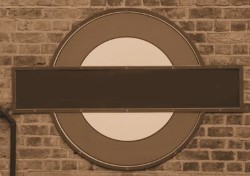 |
The train, loaded with the investigators, Cavendish, Horton, Blakeney and the salvaged artifacts, pulled out of Woking station and headed back towards London. To begin with, the route was the same as they had come by, but at the edge of the city the train went across some points and plunged into the Underground, largely untouched by the Martians.
Several stations flashed by, and then the train entered quite a long tunnel with no stations or lights. After a while, it slowed and drew to a halt in what looked like a normal Underground station, though it was very dusty and entirely deserted. As well as doorways for passengers, two enormous portals the size of barn doors opened from the platform; all the entrances were sealed with heavy steel doors.
Holmes glanced at the sign as it went by and raised his eyebrows; it was blank.
"Here we are!" said Cavendish jovially.
Session Date: 18th February 2015 |